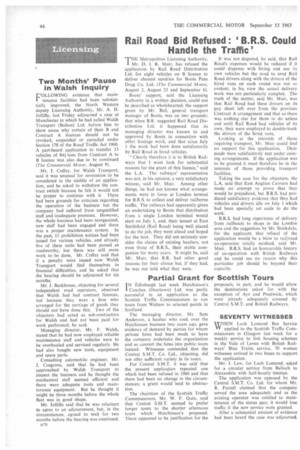Rail Road Bid Refused : B.R.S. Could Handle the Traffic'
Page 46

If you've noticed an error in this article please click here to report it so we can fix it.
THE Metropolitan Licensing Authority, Mr. D. I. R. Muir, has refused the application by Rail Road Distribution Ltd. for eight vehicles on B licence to deliver chemist sundries for Boots Pure Drug Co. Ltd. (The Commercial Motor, August 2, August 23 and September 6). Boots' support, said the Licensing Authority in a written decision, could not be described as wholehearted; the support given by Mr. Bell, general transport manager of Boots, was on two grounds: that when Belt. suggested Rail Road Distribution Ltd. it happened that its managing director was known to and approved by Boots in connection with other haulage work, and that since July 1 the work had been done satisfactorily by Rail Road in hired vehicles_ "Clearly therefore it is to British Railways that I must look for substantial reasons for the grant of this licence," said the L.A. The railways' representative was not, in his opinion, a very satisfactory witness, said Mr. Muir. Among other things, he had not known what arrangements were in force at London termini for B.R.S. to collect and deliver railborne traffic. The railways had apparently given an undertaking to Boots that distribution from a single London terminal would start on July 1, and, their tenant at East Smithfield (Rail Road) being well placed to do the job, they went ahead and hoped for the best. They did not seriously consider the claims of existing hauliers, not even those of B.R.S., their stable companion for many years. It might be, said Mr. Muir, that B.R. had other good reasons for their choice but, if they had, he was not told what they were. It was not disputed, he said, that Rail Road's expenses would be reduced if it could dispense with hiring and use its own vehicles but the need to send Rail Road drivers along with the drivers of the hired vans on each round was not so evident; in his view the actual delivery work was not particularly complex. The truth of the matter, said Mr. Muir, was that Rail Road had these drivers on its pay sheet left over from the previous Contract A arrangement and that as there was nothing else for them to do unless and until Rail Road had vehicles of its own, they were employed to double-hank the drivers of the hired vans. Looking at the interests of those requiring transport, Mr. Muir could find no support for this application. Their needs were satisfactorily met under existing arrangements. If the application was to be granted it must therefore be in the interests of those providing transport facilities. Taking the case for the objectors, the L.A. said that East Anglian Carriers had made no attempt to prove that they would be prejudiced, but B.R.S. had produced satisfactory evidence that they had vehicles and drivers idle on July 1 which had been specially set aside to do the work.
B.R.S. had long experience of delivery from railheads to shops in the London area and the suggestion by Mr. Stockdale, for the applicant, that refusal of the application would be a blow to rail/road co-operation totally misfired, said Mr. Muir. B.R.S. had an honourable history of co-operation with British Railways and he could see no reason why this particular job should be beyond their capacity.




















































































































